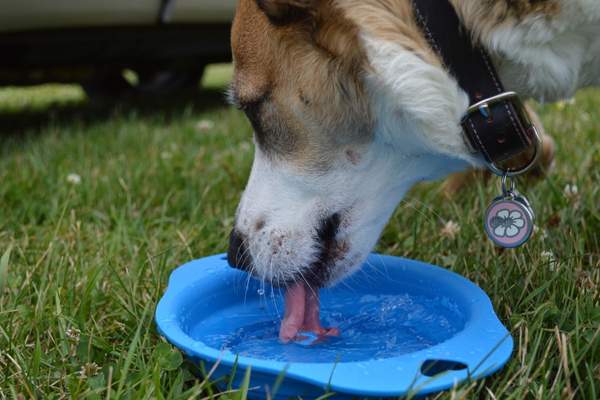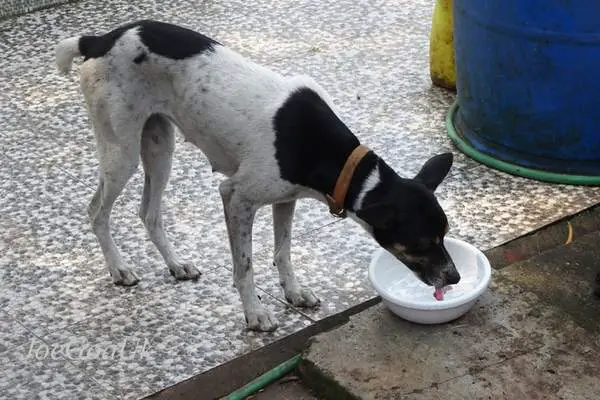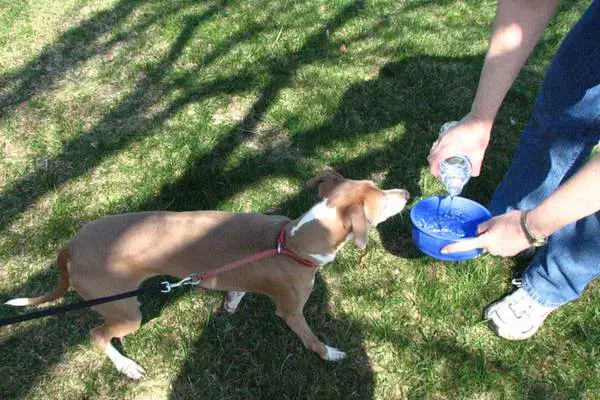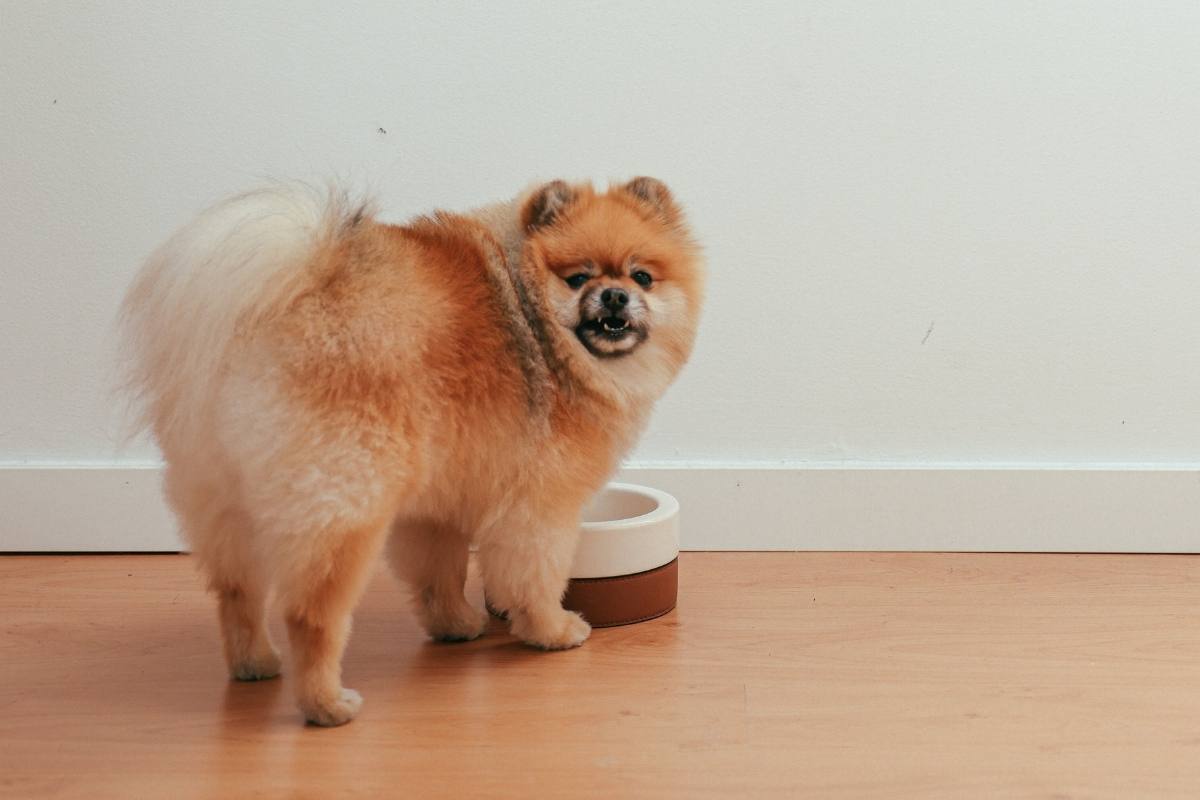Sometimes our dogs do weird things, and it isn’t always easy to figure out why. It takes trial and error to discover the reason for strange behavior, and sometimes the only feedback you’ll get from your dog is a pleading look. Cute, but not helpful.
So, why does my dog bark at his water bowl? Most often this problem has to do with the water bowl itself, the bowl’s location, or an experience with the bowl. If your dog is older, it could also have to do with dementia or vision problems.
In this article we’ll spend most of our time discussing the water bowl itself. Then at the end of the article we’ll look at some of the possible medical causes. But it will be up to you to do the leg work to find the answer for your dog.
Your Water Bowl is Scary

When a dog barks at a water bowl it could be because something about the bowl scares or upsets him. What could possibly be scary about a water bowl, you ask? Well, most dog complaints with water bowls seem to be with metal bowls, and if we think like our dogs for a moment, we might be able to understand why.
Reflection
Has your dog ever barked at his reflection in a mirror or a sliding glass door? It takes dogs a while to understand reflections, and some never really get it. They see another dog and instead of thinking “That’s just my reflection,” they think “That’s another dog.”.
Now get down on all fours and look at your dog’s metal bowl. You can see your warped reflection, right? That’s what your dog sees, so it’s possible that your dog barks at his water bowl because he thinks he sees a really weird looking dog.
While it may sound annoying, your dog is just doing what instinct tells him to do. He’s tries to warn the other dog off his territory, or he tries to greet him. When the other dog doesn’t respond, he just gets frustrated and barks more.
Sound
Most dog owners have experienced the following situation. You’re sitting in your living room during a quiet evening, and suddenly a car door shuts about two blocks away. Your dog goes to the window, tail up, and starts barking. Dogs are extremely sensitive to noise and are alert for anything that may come into their territory.
A metal water bowl resonates more than plastic or ceramic, especially with other metal. So, if your dog’s collar makes a clanging noise against the metal bowl while your dog is drinking, it could alarm him and cause him to start barking at his bowl.
For a possible solution, switch out your dog’s metal bowl for a plastic or ceramic bowl and see if that helps.
Your Water Bowl’s Location is Scary

Your dog may not actually be barking at his water bowl, but at a something close to it and possibly for the same reasons listed above. You probably haven’t set your dog’s water bowl by a mirror, but you’ve possibly set it by the glass slider that opens to the back yard.
Possibly your dog’s reflection in the slider is the cause of barking, while positionally it looks like your dog is barking at the bowl.
Reflection isn’t the only possible cause for your dog’s alarm. Try to imagine what your dog might hear. Maybe a digital watch is beeping. Maybe your ultra-quiet dishwasher still makes a disturbing grinding noise. Maybe you’ve set your dog’s water bowl next to a vent and when the AC clicks on it startles your dog.
Try this:
Think carefully about the location of your dog’s water bowl and move it to different spots in the house where those distractions aren’t present.
Your Water Bowl’s Association is Scary
When we associate one thing with another, the two things may be naturally related, or they may not be. For example, they may be two things of the same category, or simply two unrelated things that we remember about a place.
If your dog isn’t barking at his water bowl or at something near his water bowl, he may be barking at something he associates with his water bowl, something scary or upsetting that may not be related to the water bowl at all. This is a little trickier to figure out, so try to be creative and think outside the box.
While researching this article, I came across an online discussion between a dog owner and a veterinarian discussing the water bowl problem. Over the course of the feed, the vet figured out that the owner’s dog was also afraid of the pool sweeper in the swimming pool.
The vet suggested that the dog may be relating his fear of the swimming pool to the water bowl. If something weird lurks in the swimming pool, maybe it lurks in the water bowl too. Sometimes your dog’s reasoning may not be so creative. Your dog may have a simple pain association with his water bowl, and that association may have nothing to do with the bowl itself.
On a totally unrelated note, dogs can have back and neck pain just like you, even herniated discs that put pressure on spinal cord nerves. In fact, Dachshunds, Poodles, and Beagles are especially prone to these problems.
Your dog may have experienced pain from a pinched nerve when bending to drinking. As a result, your dog may bark at his water bowl because he anticipates pain when he drinks.
Try this:
If your dog has had a negative experience that he associated with the water bowl, try petting him or playing with him near the bowl to change that perception.
Possible Medical Problems

If you have gone through all the practical solutions above and your dog is still barking at his water bowl, here are a couple more things to consider. As with all things medical, be sure to take your best friend to a vet to get the care they need.
Dementia in Dogs
Unfortunately, just like us, dogs can suffer from dementia. Also just like us, dogs are living longer because of good health care. The longer your dog lives, the more of a chance he has of experiencing canine cognitive dysfunction (CCD).
Among the symptoms of CDC are disorientation and barking. This means your dog may be barking at his water bowl because he is confused. If you have an older dog, here are some other symptoms to watch for:
- anxiety
- pacing (or other repeated behaviors)
- staring at walls
- getting lost
- howling or whining
- difficulty sleeping
There is no cure for dementia, but your vet may be able to alleviate some of the symptoms. It’s also important for your dog to stay as active and engaged as possible.
Vision Problems
Many of the practical problems with the water bowl that we looked at earlier involve a misperception of what the water bowl is. There may be something else causing a misperception and that is actual damage to your dog’s vision.
If you notice that your dog’s eyes are cloudy looking or appear to have a film over them, you should consult your dog’s vet. Here are a couple possible eye problems.
Nuclear Sclerosis is a serious sounding word for a less serious eye condition where fibers cloud the normally clear lens. This condition isn’t painful, and it doesn’t result in severe vision loss, but it can affect things like depth perception. If your dog can’t clearly see the surface of water, then he may overshoot the distance submerging his snout and causing a surprised reaction.
Another more serious condition is cataracts. Cataracts occur when water or protein balances in the lens change, causing a milky cloudiness. Cataracts can ultimately cause blindness. They can’t be treated with medication, but they can be treated with surgery.
If your dog is unable to clearly perceive objects around him, he may bark at them from a confusion that derives from physical, not mental impairment.
Conclusion
Fortunately, when addressing your dog’s persistent barking at his water bowl, there are a lot of practical steps you can take.
First consider the water bowl itself. Remember that metals bowls can sometimes alarm your dog with a concerning reflection or a metallic clanking sound. Take some time to consider the location of your dog’s water bowl, since reflective surfaces around the bowl may also cause him alarm.
Other things in the area of the bowl like vents or appliances might distract or startle your dog. Also think about experiences your dog has had that would cause him to be suspicious of the bowl. In all these cases you can try the practical solutions we discussed.
If these don’t work, consider your dog’s mental and physical health. Confusion can come from both vision and mental impairment and are things that your dog’s vet can evaluate.

